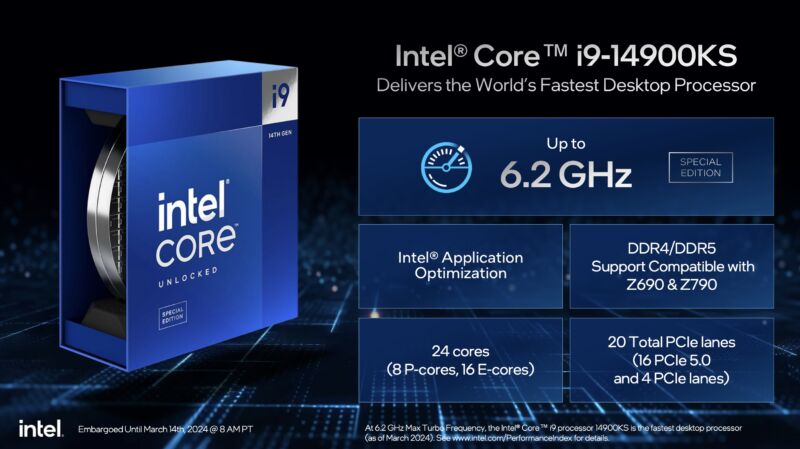

Intel’s 6.2 GHz Core i9-14900KS is a reminder of why the MHz wars ended
source link: https://arstechnica.com/gadgets/2024/03/intel-revives-the-mhz-race-with-6-2-ghz-power-guzzling-core-i9-14900ks/
Go to the source link to view the article. You can view the picture content, updated content and better typesetting reading experience. If the link is broken, please click the button below to view the snapshot at that time.
mega-hurts —
Intel’s 6.2 GHz Core i9-14900KS is a reminder of why the MHz wars ended
An impractical bragging-rights CPU tops Intel's 14th-gen desktop lineup.
Andrew Cunningham - 3/14/2024, 7:08 PM

PC enthusiasts who have been around the block a couple of times might remember the stretch from the '90s into the early 2000s when ever-increasing clock speeds were Intel's primary metric for increasing processor performance. AMD participated, too—it managed to beat Intel to 1 GHz in what was considered a major coup at the time—but Intel's Pentium 4 processors specifically prioritized boosting clock speeds at the cost of instructions-per-clock.
Today, the company is ever so briefly revisiting those old days with the $689 Core i9-14900KS, its newest flagship desktop processor. The i9-14900KS can hit speeds of 6.2 GHz out of the box, a small push past the last-generation i9-13900KS and the i9-14900K that topped out at 6.0 GHz. Like other recent high-end Intel desktop chips, it also features Intel's "Adaptive Boost Technology," which will allow the chip to increase its power consumption and performance until it hits 100° Celsius.
This kind of clock speed boosting is both impressive and impractical. On the one hand, Intel has managed to push clock speeds even higher without changing its architecture or manufacturing process, a culmination of years of iteration across the 12th-, 13th-, and 14th-generation processor families. On the impractical side, the i9-14900KS can use a ridiculous amount of power to achieve marginally faster performance, reminding us of the laws of physics that helped shut down the megahertz wars in the first place.
AdvertisementIntel's specs list a special 320 W TDP level for the i9-14900KS, significantly higher than the 253 W TDP for the Core i9-14900K (though manufacturers often ignore Intel's specs here, allowing CPUs to run with effectively unlimited TDPs and relying on thermal throttling to keep processors from frying themselves).
In terms of real-world power usage, testing from Tom's Hardware demonstrates some pretty huge gaps between the amount of power used and the amount of performance gained. In one Blender rendering benchmark, the i9-14900KS consumed 31 percent more power than the i9-14900K for a less than 1 percent performance gain. The gap isn't always quite that large, but the power usage increase is generally disproportionate to the performance increase.
These kinds of impractical bragging-rights-only processors probably won't go away, but this could be the end of the line for Intel's Core i9 branding, the 14th-gen Core processor lineup, the LGA 1700 processor socket, and the Raptor Lake processor architecture. Never say never—Intel does love to rebrand and reuse old silicon to launch quote-unquote new products—but current rumors suggests that the new LGA 1851 socket and next-gen "Arrow Lake" processors will become Intel's flagship desktop platform at some point in the next year or so.
Recommend
About Joyk
Aggregate valuable and interesting links.
Joyk means Joy of geeK